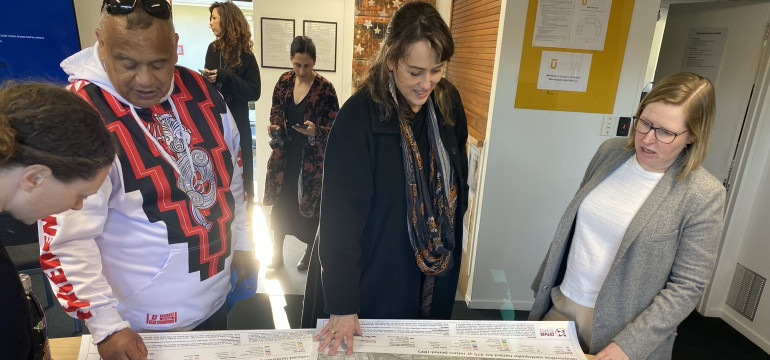Iwi works with scientists to protect community from natural hazards

Porirua’s Takapūwāhia community has partnered with It’s Our Fault scientists to map its exposure to natural hazards and is using the information to protect people and property from future events.
The outputs have helped the community make important decisions about where to place emergency supplies and how to protect homes and key resources – like marae, kura and medical centres – from natural hazards.
Takapūwāhia is home to 1500 people, the majority of whom are tangata whenua from Ngāti Toa Rangatira iwi. The land is vulnerable to earthquakes, tsunami, landslides and other natural hazards, so Ngāti Toa knew it was only a matter of time before an event struck and wanted the community to be prepared.
Board Chair of Takapūwāhia Marae, Callum Kātene, says, “As climate disasters increase in frequency and intensity, Māori face growing threats to their lands, homes, taonga, people, and culture.”
Technical expertise was provided by GNS Science and funded through It’s Our Fault, a collaborative research programme studying Wellington’s earthquake risk.
Dr Andrea Wolter, a GNS landslide hazard scientist on the project team says: “This project in Takapūwāhia demonstrates how science can support communities to become better prepared and resilient to these forces.
“We started by meeting with tangata whenua to determine how we could help – this included protecting their people, buildings and infrastructure from the natural hazards they are exposed to.
“We followed this meeting with data collection, hazard mapping, impact assessment, a street survey and a rapid assessment of potential sites to host emergency supplies.
“We worked with community members to understand their needs, such as finding buried river channels, planning sites for community gardens, and locating their most vulnerable individuals. The result was a report and maps that show where natural hazards are likely to affect the community and that recommended potential sites to host their emergency response containers.”
Callum adds, “Emergency management frameworks often fail to incorporate Māori perspectives, limiting the effectiveness of disaster response efforts in our community. Future planning informed by research empowers Ngāti Toa and surrounding communities to lead themselves in times of crisis with evidence-based approaches to ensure they are able to better respond and recover from disasters.”
“Research has provided many case studies of how indigenous knowledge complements and contributes to disaster management. By blending mātauranga with advanced disaster management practices, we will identify when, where and how tikanga can provide for the unique needs of Māori and wider non-Māori communities.”
Following the success of the pilot project, It’s Our Fault scientists are looking to provide similar support to two further Wellington region communities, based on their risk exposure and interest in getting involved.
Natural Hazards Commission (NHC) Toka Tū Ake, along with Wellington City Council and the Wellington Regional Emergency Management Office, invests in It’s Our Fault to help Wellington communities build resilience to earthquakes and other natural hazards.
Dr Natalie Balfour, Head of Research at NHC and Chair of It’s Our Fault’s steering committee says, “Research and modelling is a powerful tool for decision-making about natural hazards, but we also need real people to pick up that evidence and incorporate it into their future planning. It’s fantastic to see communities like Takapūwāhia actively using science to understand their risks and build resilience to natural hazards.”